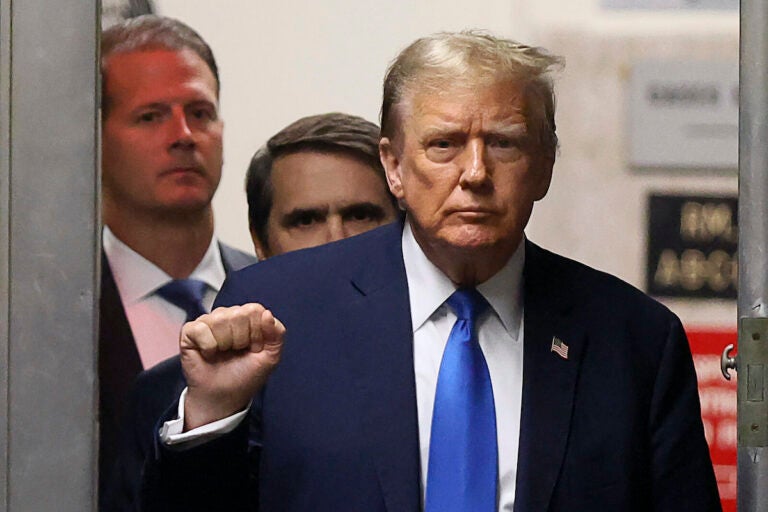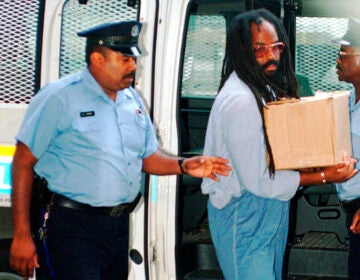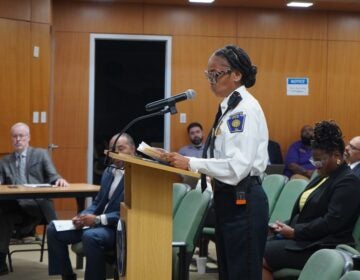What to know about week 1 of Trump’s criminal trial, with jury selection complete

Former U.S. President Donald Trump gestures, while he returns to the courtroom for his trial over charges that he falsified business records to conceal money paid to silence porn star Stormy Daniels in 2016, in Manhattan state court in New York City, U.S. April 18, 2024. REUTERS/Brendan McDermid/Pool
Former President Donald Trump spent the week in the Manhattan Criminal Court. After four days jurors have been selected to decide his fate. It is the first criminal trial of a former president.
Twelve jurors and six alternates were finalized on Friday. Opening arguments are expected to begin on Monday.
Trump faces 34 felony counts alleging that he falsified New York business records in order to conceal damaging information to influence the 2016 presidential election. Trump claims the trial itself is “election interference” because of how it is disrupting his 2024 bid for president.
Speaking to reporters outside the courtroom earlier in the week, Trump lamented that he is unable to make campaign stops in other states because New York law requires him to be present for his criminal trial, which takes place four days a week.
“I’m supposed to be in a lot of different places campaigning. But I’ve been here all day on a trial that really is a very unfair trial,” Trump said Thursday after the court session ended.
The Trump campaign has announced two upcoming rallies: one in North Carolina on Saturday, and one in south New Jersey on Saturday, May 11.
Nearly 300 prospective jurors went through the selection process. They were questioned about their opinions on Trump, their social media history, and their backgrounds.
The jurors range from all over Manhattan, including Harlem, Hell’s Kitchen, Murray Hill and the Upper West Side. They are litigators, teachers, physical therapists and investment bankers. Their hobbies range from wood and metal working, hiking, fly fishing and exploring New York City.
The prospective jurors had varying views of the case and Trump himself — opinions they shared in front of the former president, one by one.
“I think sometimes — similar to what one of the jurors said — sometimes the way he may carry himself in public leaves something to be desired. At the same time, I can relate to being a bit unfiltered,” one prospective juror admitted. “But at the same time, I see him speak to a lot of people in America, and I think there’s something to be said for that.”
This juror was not selected.
“I don’t have strong opinions, but I don’t like his persona. How he presents himself in public,” another prospective juror who made it onto the panel said. “He seems very selfish and self-serving… I don’t really appreciate that from any public servant.”
But she went on to make a personal analogy, noting she didn’t like all her coworkers but that she didn’t try to sabotage their work — so she believed she could be fair and impartial.
Another prospective juror, who was not selected, said he saw parallels between himself and Trump and was impressed by his rise as a businessman and politician. The man said he, like Trump, started out as an entrepreneur. “He was our president. Pretty amazing,” he said.
Ultimately, some self-selected out.
“I just couldn’t do it,” mumbled one prospective juror as she exited the courtroom on the first day.
Another prospective juror on Friday tearfully voiced that she was nervous and stressed and realized she may not be able to move forward after initially saying she could be impartial.
The selected jurors’ familiarity of Trump’s 88 other state and federal charges varied from unfamiliar to aware Trump faces other charges. Several reported reading and watching major newspapers, cable networks and social media, but two noted, “I don’t watch any news or follow it too closely” and that they “don’t really care for the news.”
One selected juror said he is “ambivalent” about Trump; another approved of how Trump “speaks his mind.”
The selected jurors did their best to prove they would be able to separate their political and policy preferences from the legal facts to be presented at trial.
One juror said he has “political views as to the Trump presidency” and that he thinks there were likely Trump administration policies he disagreed with.
Still, he added, “I don’t know the man, and I don’t have opinions about him personally.”
Judge Juan Merchan has tried to ensure that the jury remains anonymous, citing safety concerns. Jurors are identified by numbers, are not allowed to be photographed or recorded, and only lawyers have access to their names.
9(MDAzMzI1ODY3MDEyMzkzOTE3NjIxNDg3MQ001))




